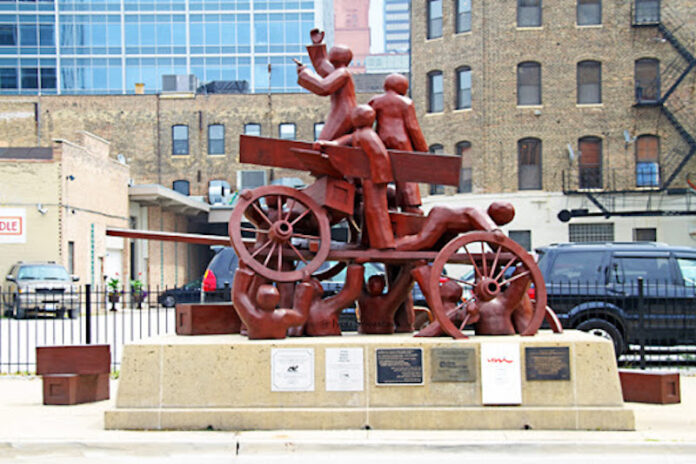
May Day — International Labor Day — began in Chicago in the fight not only for the eight-hour day, but also for immigrants’ rights.
On May 1, 1886, workers throughout the United States engaged in a massive strike to demand the eight-hour day. Chicago was the strike’s center. At that time, Chicago was the fastest growing city in the world. Chicago’s factories were being filled not only by young people being driven off the farms of the U.S. Midwest, but also by workers from England, Germany, Ireland, Poland, Bohemia, Sweden and many other countries.
Just days after that strike, on May 4, 1886, a rally was held at Haymarket Square in Chicago to protest a police attack on a group of strikers. As this peaceful rally was winding to a close, 176 cops moved in. They ordered the rally’s last speaker—an English immigrant worker, Samuel Fielden—to stop. Then someone threw a bomb. It killed one police officer instantly and wounded many others. The police opened fire, killing many participants in the rally.
A wave of hysteria followed. The police went wild, filling the city’s jails with immigrants, breaking into private homes, wrecking the printing presses of foreign-language newspapers, and arresting leaders of Chicago’s emerging trade union movement. Immigrants were accused of being terrorists; suspects were beaten and even tortured.
The authorities in Chicago exploited the Haymarket tragedy to attack the emerging trade union movement in the city. In June 1886, several leaders of the Chicago union movement were put on trial, charged with being accessories to murder at Haymarket Square and with a general conspiracy to murder. Most of the defendants had not even been present when the Haymarket bomb had been thrown, but that didn’t matter. They were militant leaders of the workers, and Chicago’s capitalists wanted their blood.
Given the composition of Chicago’s work force in 1886, it was hardly surprising that most of the accused were immigrants. Of the eight men who eventually stood trial, seven were immigrants. (One defendant – Samuel Fielden – was from Lancashire, England. Six had been raised in Germany: George Engel, Adolph Fischer, Louis Lingg, Oscar Neebe, Michael Schwab, and August Spies.) In the late 1880s, immigrant workers were concentrated in the most exploited section of the industrial work force, so it was natural that the people who emerged as leaders of the working class as a whole were often immigrants.
Only one man among the eight individuals charged in what came to be known as “the Haymarket Affair” had been born and raised in the United States. His name was Albert Parsons. He had managed to slip out of Chicago after the bombing, and escaped to the relative safety of southern Wisconsin. There, he spent a few days on the top of a hill overlooking the peaceful countryside. Then, he decided that he could not live with himself if he let his colleagues stand trial alone. On June 21, 1886 – the first day of the trial – Albert Parsons appeared in court, telling the judge: “I have come to stand trial, your Honor, with my innocent comrades.”
Tried before a biased judge and jury, the defendants never had a chance. They were convicted; seven were sentenced to hang. (An eighth was sentenced to 15 years at hard labor.) At that point, many people thought the case was closed, but they had not reckoned with Lucy Parsons, the wife of Albert Parsons and a leader of the Chicago labor movement in her own right. While the case was being appealed, Lucy Parsons traveled across the United States, speaking to anyone who would listen. In almost a year, she spoke to about 200,000 people in 16 states about the case. Her heartfelt eloquence helped spark a movement to stop the executions.
Despite worldwide protests, Albert Parsons, George Engel, Adolph Fischer, and August Spies were hanged by the state of Illinois in November 1887. (A fifth defendant, Louis Lingg, died in his cell the day before the executions.) On the morning of the execution of her husband, Lucy Parsons was arrested and locked in a cell with her children for attempting to see her husband one last time.
On July 14, 1889 – the 100th anniversary of the storming of the Bastille Prison — at the International Labor Congress in Paris, a delegate from the American Federation of Labor proposed that the Congress adopt May 1 as International Labor Day and a day to remember the “Martyrs of Chicago.” This was accepted. Ever since, May 1 has been a day for the workers of the entire world to march in unison.
On June 26, 1893, Illinois Gov. John Peter Altgeld – an immigrant from Germany – pardoned the three living Haymarket defendants: Samuel Fielden, Oscar Neebe, and Michael Schwab (all immigrants).
Altgeld’s decision produced a firestorm of criticism.
The Chicago Tribune condemned the decision with these words:
“The anarchists believed that he [Altgeld] was not merely an alien by birth, but an alien by temperament and sympathies, and they were right. He has apparently not a drop of true American blood in his veins. He does not reason like an American, not feel like one, and consequently does not behave like one.”
Given all this history, can anyone doubt that the fight for immigrant rights is interwoven throughout the celebration of May Day? This year, let’s honor the memory of the Haymarket Martyrs – both immigrant and native-born – by demanding justice for today’s immigrant workers. Perhaps the lesson of May Day can be summed up best in the words of Haymarket defendant Oscar Neebe. The last words of his autobiography read simply: “I call on all workingmen or working women of all nationalities and all countries to unite and down with your oppressors.”
